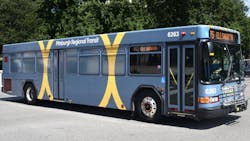Pennsylvania transit agencies’ FY 26 budgets feature massive service cuts, fare increases
The Southeastern Pennsylvania Transportation Authority (SEPTA) and Pittsburgh Regional Transit (PRT) have approved their fiscal year (FY) 2026 operating and capital budgets. Both Pennsylvania transit agencies’ budgets feature service cuts and fare increases after the city of Harrisburg, Pa., did not take action to provide new funding for public transit.
SEPTA’s FY 26 operating budget to cut service by 45 percent and raise fares by 21.5 percent
SEPTA’s FY 26 operating budget will cut service by 45 percent and raise fares by 21.5 percent to fill a $213 million recurring budget deficit.
“This is a vote none of us wanted to take,” said SEPTA Board Chair Kenneth E. Lawrence Jr. “We have worked hard as an authority to prevent this day from coming because we understand the impact it will have on our customers and the communities we serve. To be clear, this does not have to happen – if state lawmakers can reach an agreement to deliver sufficient, new funding for public transit.”
Under the budget approved by the SEPTA Board, beginning with the fall schedule change on Aug. 24, customers will first see the elimination of 32 bus routes and significant reductions in trips on all rail services, including the end of special services like Sports Express.
On Sept. 1, a fare increase averaging 21.5 percent for all riders will go into effect. The new base fare for bus and Metro trips will be $2.90, which the agency says ties New York’s Metropolitan Transportation Authority for the highest in the country. At the same time, SEPTA will also freeze all hiring, including bus operators, which the authority says it has overcome a chronic shortage of operators that started during the COVID-19 pandemic.
On Jan. 1, 2026, SEPTA says service cuts will deepen with the elimination of five Regional Rail lines, more bus routes and the implementation of a 9:00 p.m. curfew on all remaining rail services. SEPTA notes all of the cuts will also force the postponement of plans to overhaul the bus network, previously known as Bus Revolution.
“This budget will effectively dismantle SEPTA, leaving the city and region without the frequent, reliable transit service that has been an engine of economic growth, mobility and opportunity,” said SEPTA General Manager Scott A. Sauer. “Once this dismantlement begins, it will be almost impossible to reverse, and the economic and social impacts will be immediate and long-lasting for all Pennsylvanians – whether they ride SEPTA or not.”
SEPTA says the $213 million budget deficit it is facing is due to a combination of the end of federal COVID-19 relief funding and increases in the day-to-day costs of providing service to customers. The federal COVID-19 funds helped SEPTA maintain service for essential workers through the pandemic and into the recovery.
According to SEPTA, while ridership has recovered during the past few years, the agency has had to take on additional costs to address emerging challenges, particularly crime, disorder and the vulnerable population. The authority notes it has also had to grapple with the impact of inflation on everyday necessities such as fuel, power and supplies.
The agency says it has been responding to this funding crisis by cutting costs and generating new revenue. Aggressive austerity measures, including a freeze on management pay and cuts to third-party consultants, have resulted in savings of more than $30 million. Other measures, including a 7.5 percent fare increase and the resumption of paid parking at Regional Rail lots, are generating new revenue.
SEPTA is required by law to pass a balanced operating budget prior to the start of the new fiscal year on July 1 and the authority says its only option to close such a massive structural deficit is to raise fares and cut costs by eliminating services and reducing the size of its workforce.
The board also approved SEPTA’s FY 26 capital budget, which will defer $2 billion worth of projects, including critical station accessibility improvements, which the agency says will be delaying better access for riders who rely on Metro and Regional Rail services.
PRT’s FY 26 operating budget to cut service by 35 percent and raise fares by nine percent
The PRT Board approved the agency’s FY 26 operating and capital budgets. The $539.3 million operating budget assumes a 35 percent service cut and a nine percent fare increase in 2026. PRT says the service cuts and fare increase hinges on any new funding for public transit in the state’s FY 26 budget.
PRT CEO Katharine Kelleman notes the approved budget is not an indication that service cuts are finalized. Instead, it positions the agency to meet its legal obligation to pass a balanced budget by July 1 while preserving the flexibility to amend the budget later in the fiscal year should state funding levels change.
“The board is simply giving us a balanced budget within the required deadline,” Kelleman said. “We remain hopeful for a long-term solution to fund public transit.”
If the service cuts and fare increases go into effect, PRT says ACCESS, its contracted paratransit service, would see a 62 percent reduction in its service area and a 20 percent increase in fares. PRT notes impacts will be felt throughout the region:
- 40 bus routes and the Silver Line would be eliminated completely.
- Service frequency on 53 bus routes and the Red Line would be reduced.
- 19 municipalities and three Pittsburgh neighborhoods would lose service completely.
- No service after 11:00 p.m.
- Funding to support extra service for sporting events like the 2026 NFL Draft and concerts would not exist.
PRT notes its $187.9 million capital budget allows the agency to continue advancing key infrastructure and investments that support a safer, more reliable transit network for the region. The capital budget also includes $38 million for new buses, $16.1 million to rehabilitate the Panhandle Bridge – the span that carries light-rail vehicles over the Monongahela River – and $15 million to replace the tracks inside the Mount Lebanon Transit Tunnel, which travels between Dormont and Mount Lebanon.
“Our region’s future depends on transit,” Kelleman said. “It’s how we grow, how we compete and how we make opportunities real for everyone.”
Negotiations in Harrisburg underway to save transit cuts and fare increases
Earlier this year, Pennsylvania Gov. Josh Shapiro proposed a statewide transit funding plan that would provide new, sustainable funding that would prevent the service cuts and fare increases for both agencies from taking effect and preserve essential transit service statewide. The Pennsylvania House of Representatives last week advanced the governor’s proposal, along with new funding for roads and bridges. Both SEPTA and PRT say negotiations in Harrisburg are underway.
About the Author
Brandon Lewis
Associate Editor
Brandon Lewis is a recent graduate of Kent State University with a bachelor’s degree in journalism. Lewis is a former freelance editorial assistant at Vehicle Service Pros in Endeavor Business Media’s Vehicle Repair Group. Lewis brings his knowledge of web managing, copyediting and SEO practices to Mass Transit magazine as an associate editor. He is also a co-host of the Infrastructure Technology Podcast.


